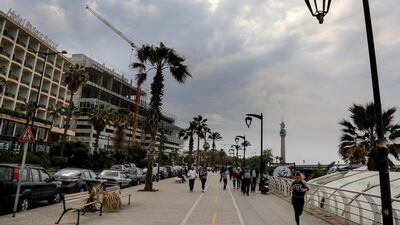S&P Global Ratings affirmed Lebanon's sovereign credit rating even as the country's public debt, already among the highest in the world, is set to rise. Deposit inflows will provide enough support to the country’s economy over the next 12 months, the agency said.
“We anticipate that the general government debt burden will continue to rise from already high levels through 2021, but that deposit inflows will remain sufficient to support Lebanon's large twin-deficits,” the rating agency said in a report on Saturday. “Lebanon's general government debt, which we estimate at 140 per cent of GDP in 2017, is the third highest among all sovereigns we rate, after Japan and Greece.”
S&P, which affirmed Lebanon’s 'B-/B' ratings with a stable outlook, said the government's debt-servicing capacity depends largely on the domestic financial sector's willingness and ability to add to its holdings of government debt. The state in turn relies on bank deposit inflows, particularly from non-residents, and also on central bank financing, it said.
Lebanon's structural and institutional weaknesses have hindered economic outcomes and weakened public finances, as evident from the country's consistently large fiscal deficits and rising public debt levels. The structural problem constrains the sovereign ratings, according to S&P, as do Lebanon's divided political environment and political uncertainties in the wider Middle East region.
_______________
Read more
Lebanon likely to approve 2018 budget before mid-March, finance minister says
Lebanon's debt-to-GDP could balloon to 180% by 2023, IMF warns
_______________
The country's Finance Minister last week said Lebanon is trying to get its 2018 budget approved by cabinet by mid-March, as it seeks to agree its spending plans before upcoming investment conferences.
Lebanon aims to win billions of dollars of international investment at a Paris conference next month, as it seeks funding for a 10-year, $16 billion capital investment programme aimed at lifting economic growth.
The minister, Ali Khalil, has previously said Lebanon will not be able to ask international donors for support unless it first passes the 2018 budget to show backers that Beirut is serious about economic reforms.
S&P said any deterioration in Lebanon’s political and economic situation or deposit outflows and a decline in foreign currency reserves could add pressure on ratings. However, predictable and clear policymaking framework, a significant boost to economic activity, and improving the fiscal and external imbalances could impact ratings positively.


